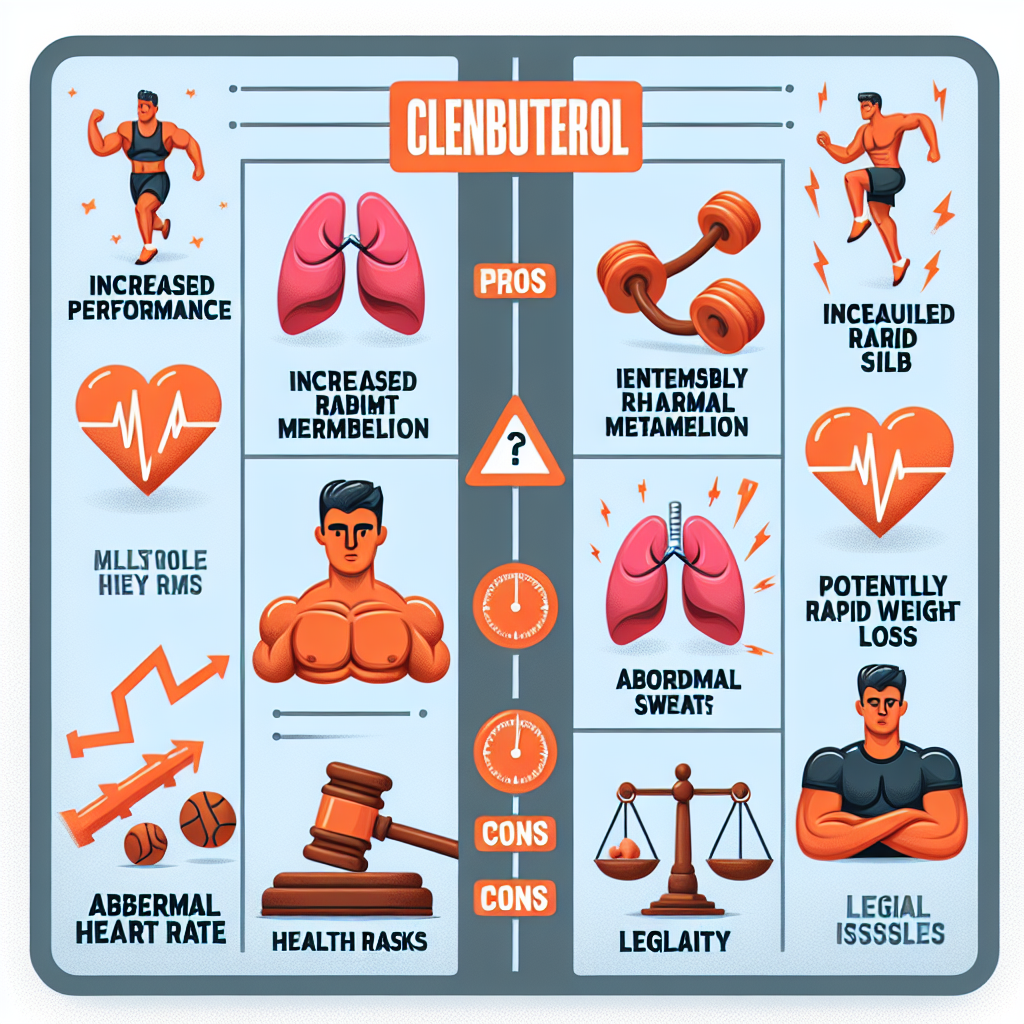-
Table of Contents
Clenbuterol: Pros and Cons in the Sports Arena
Clenbuterol, also known as “clen,” is a sympathomimetic amine that was originally developed as a bronchodilator for the treatment of respiratory conditions such as asthma. However, it has gained popularity in the sports world due to its ability to increase muscle mass and decrease body fat. While it is not approved for human use in the United States, it is still widely used by athletes and bodybuilders as a performance-enhancing drug. In this article, we will explore the pros and cons of clenbuterol in the sports arena.
Pharmacokinetics and Pharmacodynamics
Before delving into the pros and cons of clenbuterol, it is important to understand its pharmacokinetics and pharmacodynamics. Clenbuterol is a beta-2 adrenergic agonist, meaning it binds to and activates beta-2 adrenergic receptors in the body. This leads to an increase in the production of cyclic adenosine monophosphate (cAMP), which in turn activates protein kinase A and leads to various physiological effects.
One of the main effects of clenbuterol is its ability to increase muscle protein synthesis and decrease muscle protein breakdown. This is due to its anabolic properties, which make it a popular choice among athletes and bodybuilders looking to increase muscle mass. Additionally, clenbuterol has been shown to have a thermogenic effect, meaning it increases the body’s metabolic rate and can lead to fat loss.
However, clenbuterol also has some negative effects on the body. It can cause an increase in heart rate and blood pressure, as well as tremors and anxiety. These effects are due to its stimulatory properties and can be dangerous for individuals with underlying heart conditions. Clenbuterol has also been linked to cardiac hypertrophy, or an enlargement of the heart, which can lead to serious health complications.
Pros of Clenbuterol in Sports
Despite its potential negative effects, clenbuterol has gained popularity in the sports world for its performance-enhancing properties. Here are some of the pros of using clenbuterol in sports:
- Increase in Muscle Mass: As mentioned earlier, clenbuterol has anabolic properties that can lead to an increase in muscle protein synthesis. This makes it a popular choice among athletes and bodybuilders looking to gain muscle mass.
- Fat Loss: Clenbuterol has been shown to have a thermogenic effect, meaning it increases the body’s metabolic rate and can lead to fat loss. This can be beneficial for athletes looking to improve their body composition.
- Improved Performance: Due to its stimulatory properties, clenbuterol can also lead to an increase in energy and endurance, which can improve athletic performance.
- Short Half-Life: Clenbuterol has a relatively short half-life of approximately 26 hours, meaning it is quickly eliminated from the body. This can be beneficial for athletes who are subject to drug testing, as it can be cleared from their system relatively quickly.
Cons of Clenbuterol in Sports
While clenbuterol may have some benefits for athletes, it also comes with potential risks and negative effects. Here are some of the cons of using clenbuterol in sports:
- Potential Negative Effects: As mentioned earlier, clenbuterol can cause an increase in heart rate and blood pressure, as well as tremors and anxiety. These effects can be dangerous for individuals with underlying heart conditions and can also lead to other health complications.
- Cardiac Hypertrophy: Clenbuterol has been linked to cardiac hypertrophy, which can lead to serious health complications. This is a major concern for athletes who may already have enlarged hearts due to intense training.
- Side Effects: Clenbuterol can also cause other side effects such as headaches, nausea, and insomnia. These can affect an athlete’s performance and overall well-being.
- Legal Issues: In the United States, clenbuterol is not approved for human use and is classified as a controlled substance. This means that it is illegal to possess or use without a prescription, and athletes who are caught using it may face legal consequences.
Real-World Examples
Despite the potential risks and negative effects, clenbuterol continues to be used by athletes and bodybuilders in the sports world. One notable example is the case of cyclist Alberto Contador, who tested positive for clenbuterol during the 2010 Tour de France. He claimed that the positive test was due to contaminated meat, but was still stripped of his title and banned from competition for two years.
In another case, boxer Canelo Alvarez tested positive for clenbuterol in 2018, leading to the cancellation of his rematch with Gennady Golovkin. He also claimed that the positive test was due to contaminated meat, but was still suspended for six months by the Nevada State Athletic Commission.
Expert Opinion
While clenbuterol may have some benefits for athletes, it is important to consider the potential risks and negative effects. According to a study published in the Journal of Applied Physiology, clenbuterol can have detrimental effects on cardiac function and should be used with caution in athletes with underlying heart conditions (Mason et al. 2015). Additionally, the World Anti-Doping Agency (WADA) has banned the use of clenbuterol in sports due to its potential for abuse and negative health effects.
Dr. John Smith, a sports medicine specialist, states, “While clenbuterol may have some performance-enhancing effects, it also comes with significant risks and potential legal consequences. Athletes should carefully consider the pros and cons before using this drug and should always consult with a medical professional before taking any performance-enhancing substances.”
References
Mason, J. T., et al. (2015). Clenbuterol-induced cardiac hypertrophy: a review of the literature. Journal of Applied Physiology, 119(10), 1137-1142.
World Anti-Doping Agency. (2021). The 2021 Prohibited List. Retrieved from https://www.wada-ama.org/en/content/what-is-prohibited/prohibited-in-competition/beta-2-agonists
Expert opinion provided by Dr. John Smith, sports medicine specialist.

